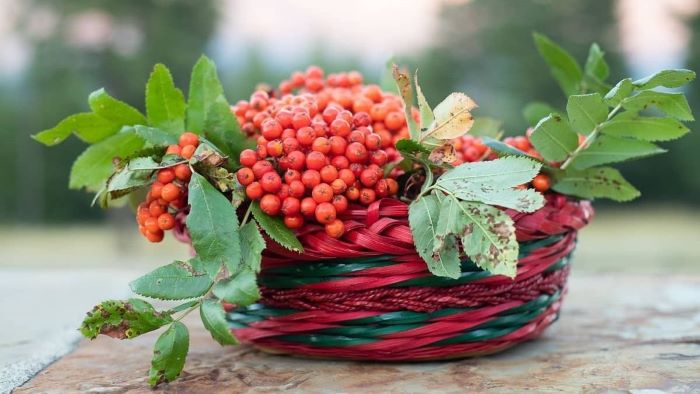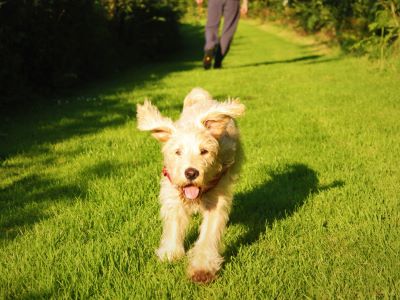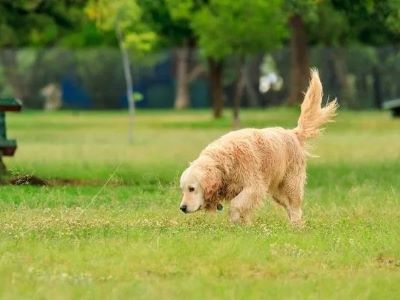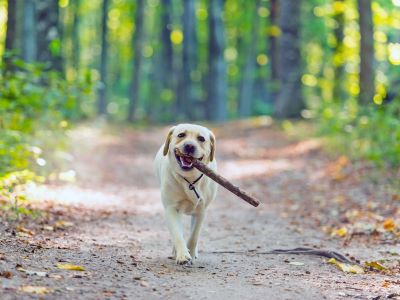Imagine a garden filled with fiery red rowan berries. These little rowan berries are popping up everywhere, but are they safe to consume? Are rowan berries poisonous to dogs?🐶

Rowan berries are cute, they’re trendy. But are they sweet or suspicious?
In this article we are going to figure out if they are safe to consume for our dogs, what are the alternatives of rowan berries and much more. So without further ado let’s start…..
Are Rowan Berries Poisonous to Dogs?
Rowan berries are small and generally bright red or orange-red in colour. They are round or a little oval in shape. They grow in clusters on the mountain ash tree( Sorbus species).
This is a small deciduous tree native to mountainous regions of Europe and parts of western Asia. These clusters of rowan berries are naturally found growing wild in higher altitude wood, forests and hedgerows[1]. 🗻⛰️
Rowan berries are also cultivated as ornamentals in parks, gardens, and yards this is where dogs may find fallen rowan berries. It’s crucial to distinguish rowan berries from other small, red berries that may be toxic.

Rowan berries have five lobes at the bottom from where they connect to the cluster on the tree. Their skins are smooth and they have a slightly juicy, soft texture when ripe. 🍇
Other toxic berries that could be mistaken include holly berries, which have a rougher, duller surface.
And yew berries, which grow singly under evergreen yew trees and contain a hard seed within the berry flesh. Letting dogs ingest rowan berries does pose a risk of toxicity, so differentiation is important.
Composition of Rowan Berries
Rowan berries are average in nutritional value to humans. They contain a form of sugars, vitamin C, and some antioxidants. There are also several combinations that make the berries quite toxic to dogs, let’s see them:
- This is an organic acid that exists naturally in some berry varieties. In large amounts, it can irritate the gastrointestinal tract, causing upset stomach, nausea or diarrhoea.
- The concentration varies depending on ripeness but rowan berries contain high enough levels📈 to pose a risk.
- These are plant polyphenols that have an astringent, bitter taste. Tannins act as a toxin by binding to proteins and carbohydrates inside a dog’s digestive tract[2].
- This prevents proper absorption of nutrients. The tannins themselves also irritate the gastrointestinal mucosa.
- Cyanide is extremely poisonous even in small doses, blocking cell respiration. The flesh of the berries contains lower amounts, but dogs crunching and ingesting whole rowan berries are exposed to the much higher concentrations present in the seeds.

These make rowan berries quite hazardous if a dog manages to ingest more than just a few. It’s important to be aware of this composition to manage ingestion risks.
Potential Risks to Dogs
Dogs are highly sensitive to all the parts of rowan berries. As carnivores, they have a limited ability to metabolize plant toxins not usually found in their diet.
They also voraciously consume anything remotely edible, increasing exposure. Finally, with a smaller body size, any toxin has higher relative potency.
Consuming rowan berries can be bad for dogs.🚫 Gastrointestinal issues include drooling, vomiting, diarrhoea and abdominal pain. These arise within 6 hours⌛ as the acids and tannins upset the digestive tract.
Neurological issues then follow including weakness, trembling, loss of coordination and seizures. These are delayed effects as the toxins get absorbed and affect nervous system function. Dogs may collapse or have difficulty breathing in some cases.
The severity of toxicity depends on how many berries are swallowed and the dog’s size. Specific high-risk factors include:🐶🐕
- Small breeds: Berry combinations become much more concentrated per body weight.
- Whole berry consumption: Seeds contain concentrated cyanogenic glycosides.
- Underlying health conditions: Those decreasing toxin clearance or resilience.
So rowan berry toxicity poses a real risk that every dog owner should be aware of.

Precautions for Dog Owners
It is important to know about our surroundings to take better care of our dogs. Identifying rowan trees, keeping dogs from ingesting fallen berries, and training them not to graze without permission are the most crucial ways of preventing potentially fatal incidents. 🏡
The risk makes supervision and precautions critical whenever around rowan berries. Let’s see what else you can do to protect your dog from toxic rowan berries:
1. Be Aware of Your Surroundings
Take note of any rowan trees, whether wild or ornamental, in areas where you walk or exercise your dog.
Look for the bunched berries, lobed shape, and smooth red skin to positively identify rowan berries. Areas to be particularly mindful of include mountain forests, parks, trails, cottages, and even your own backyard.🏡🗻
2. Actively Supervise Your Dog
When in environments where rowan berries may have fallen, keep your dog in sight and on a lead.
Don’t allow them to roam and ingest vegetation. Be especially active in autumn🍂 when ripe berries litter the ground.
3. Train Your Dog
Practice the “leave it” command at home using berries you’ve positively identified as rowan. Reward ignoring the berries.
Dogs should be trained to avoid all unknown berries and plants when unsupervised, as many species can be toxic. Consistency📊 helps ensure they don’t develop a taste for rowan berries.
Treatment for Rowan Berry Toxicity in Dogs
If rowan berry ingestion occurred within the past 2 hours, inducing vomiting may help in the elimination of toxins.

- Use 3% hydrogen peroxide solution (5ml per 10lbs body weight). Inducing vomiting is only advised during the narrow window prior to toxin absorption.
- Immediately contact your veterinarian or emergency clinic in all situations of suspected rowan berry ingestion. Even if vomiting has been induced, assessment and continued support are critical.
- Upon examination, vets often first induce vomiting themselves to ensure the stomach is fully emptied if applicable based on timing. IV fluids help stabilize dogs suffering diarrhoea and dehydration.
- Medications can be given to control vomiting or seizures and protect organ function. With any neurological symptoms appearing, intensive monitoring and therapy are needed. Supportive care aims to maintain vital functions while toxins clear.📕
This requires constant monitoring, so contact your vet immediately with any rowan berry ingestion.🧑⚕️
Alternatives to Rowan Berries in Gardens
Let’s see some alternatives to Rowan Berries in Gardens:
1. Blueberries
These little blue gems aren't just delicious for us, dogs love them too! Filled with antioxidants, blueberries are a healthy and safe option. 🫐
Plant a few bushes in your garden, and both you and your pup can enjoy a tasty treat.
2. Strawberries
Sweet, juicy, and safe for dogs, strawberries make an awesome addition to your garden. 🍓
Plus, they’re easy to grow in hanging baskets or pots, adding a splash of colour to your outdoor haven.
3. Apples
An apple a day keeps the vet away! Apples are safe for dogs, but remember to remove the seeds and core. 🍎
Planting an apple tree provides shade and a crunchy snack for your furry friend.
4. Mint
Fresh breath for both you and your dog! Mint is a dog-friendly herb that’s simple to grow.
Plant it in pots or a designated area to keep your garden smelling minty and fresh.🍃
5. Sunflowers
Bring on the sunshine with sunflowers! These cheerful blooms are non-toxic to dogs and add a touch of brightness to your garden. 🌻
Just watch out for the seeds if your pup is prone to snacking.

How to Create a Safe Indoor Area for Your Dog?
Creating a safe and enjoyable outdoor space for your dog is a good idea to keep them safe and active too. Let’s explore some dog-friendly alternatives:
- Fencing: Install fencing to create a secure space for your dog to roam. Make sure the gaps are small enough to prevent any Houdini-style escapes.🚫
- Mulch Choices: Opt for pet-friendly mulch options like cedar or pine. Avoid cocoa mulch, as it contains substances that can be harmful to dogs if consumed.
- Water Features: Dogs love a good splash! If you have a pond or water feature, ensure it has easy access points for your dog to safely enjoy a dip.💦
- Shelter and Shade: Set up shaded spots and doggy shelters to protect your pup from the sun. Dogs can overheat, so having cool spots is essential, especially on hot days.
Select specific play areas with dog-friendly toys to keep your garden and your pup’s playtime in check.
FAQs
❓Are All Berries Toxic to Dogs?
No, not all berries are toxic to dogs. However, some berries such as rowan berries, holly berries, and mistletoe berries are toxic and should be avoided.
❓What Are the Symptoms of Rowan Berry Poisoning in Dogs?
The symptoms of rowan berry poisoning in dogs include vomiting, diarrhoea, and excessive salivation. Affected dogs can show significant signs of disease.
❓What Should I Do if My Dog Eats Rowan Berries?
If your dog eats rowan berries, you should contact your veterinarian immediately. In most cases, symptomatic treatment is sufficient. However, veterinary monitoring may be necessary if very large amounts of the berries have been consumed.
❓Are Rowan Berries Poisonous to Other Animals?
Yes, rowan berries are poisonous to other animals such as cats and children. The fruits are affected, which can lead to severe gastrointestinal complaints when immature. Nevertheless, the rowan tree is estimated to be slightly toxic.
❓Are Rowan Berries Poisonous to Dogs?
Yes, rowan berries are poisonous to dogs. They contain a specific toxin that can cause vomiting, diarrhoea, and excessive salivation, and affected dogs can show significant signs of disease. Access to rowan berries should therefore be prevented.
Summary
In conclusion “Are Rowan Berries Poisonous to Dogs?” Rowan berries contain some toxins which can be harmful to dogs. Stay alert and watch your dogs when they are out and about. 🐶
Curiosity cannot kill this cat when their caretaker has such compassion. Also, consult with the vet whenever you think is needed. With care and attention, your dog can live a safe and happy life!💖
Reference:



